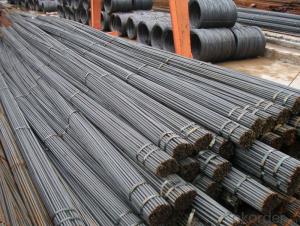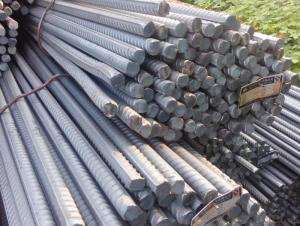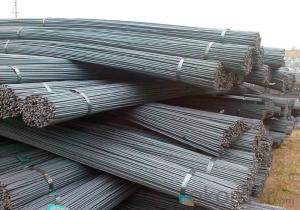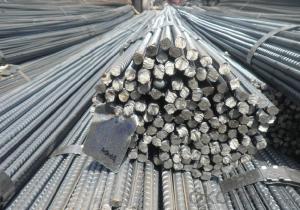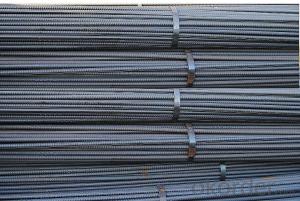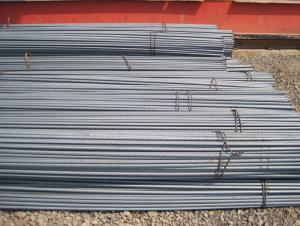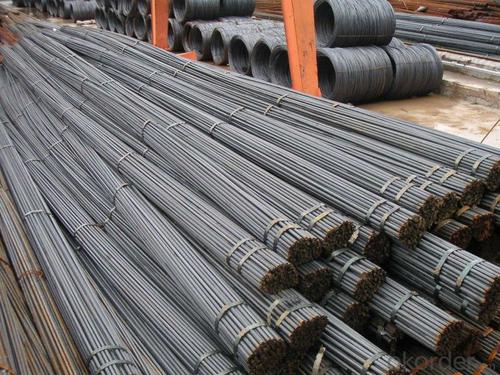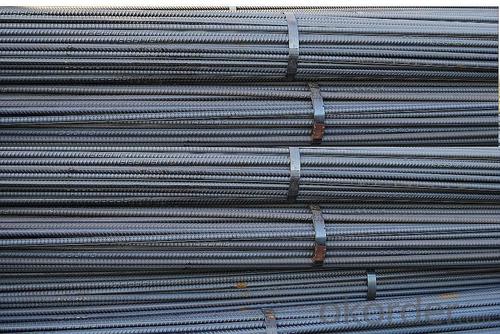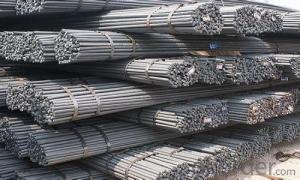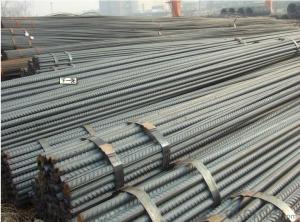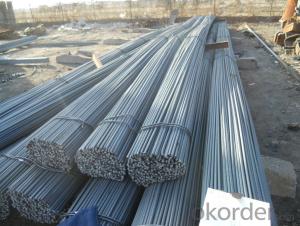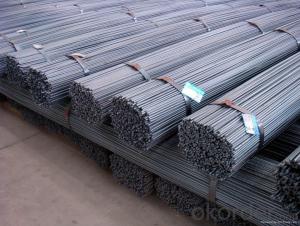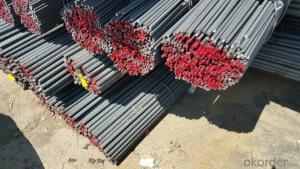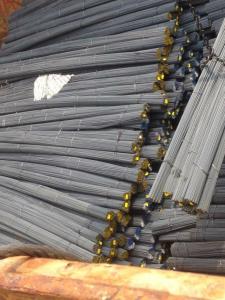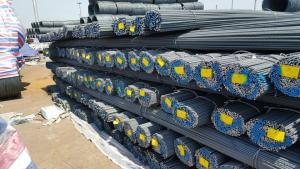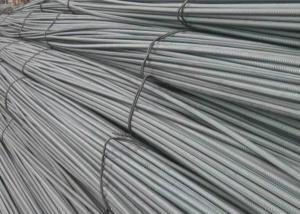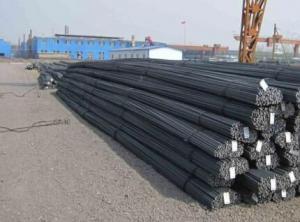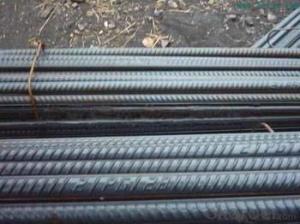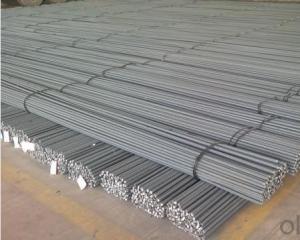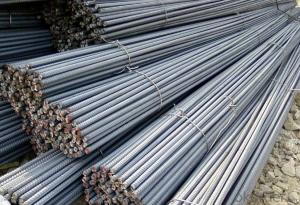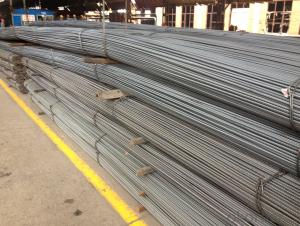HRB400 Reinforced Deformed Steel Bar
- Loading Port:
- China main port
- Payment Terms:
- TT OR LC
- Min Order Qty:
- 100 m.t.
- Supply Capability:
- 100000 m.t./month
OKorder Service Pledge
OKorder Financial Service
You Might Also Like
Specification
HRB400 Reinforced Deformed Steel Bar
Product Description:
| Item Name | Deformed Steel Bar(Rebar) | |||||||
| Standard | BS4449:1997,GB1499.2-2007 | |||||||
| Certification | ISO9001,UK CARES | |||||||
| Dimension | Diameter:6.5mm-40mm,as customer's requirement | |||||||
| Length:9000mm-12000mm,as customer's requirement | ||||||||
| Application | It is widely used in Oil pipe,Gas pipe,Construction,etc | |||||||
FAQ:
1.Q:You are Factory or Trading Company?
A:We are factory,our main products include Steel plate,Steel Bar,Steel coils.
2.Q:What’s the MOQ?
A:Generally,the trail order will be accepted.The MOQ can be confirmed according to the different products.For example,the MOQ of rebar will be 25-50MT,the galvanized steel pipe will be 10MT,the stainless steel pipe will 1-5MT.
3.Q:Do you have OEM service?
A: Yes.Variety of products size,quality and quantity can be customized according to your need.
4.Q:Could you support free sample?
A:Yes.We can supply FREE samples.But the delivery charges will be covered by our customers.
5.Q:How about the delivery time?
A:Within 15-30days after receiving the deposit or L/C at sight.
6.Q:How about the trade terms?
A:EXW,FOB,CFR,CIF will be accepted.
7.Q:How about your payment terms?
A:30%TT in advance and the balance against of copy of B/L.
The irrevocable L/C at sight will be accepted.
8. Why Choose Us?
A:Best Quality-Steel plates from China First-Class mills include heat and batch no. for tracking.
B:The most Competitive Price-As the A-Level agent of the world top 500 steel mill, they provide us the lowest price.
C:Fast Delivery-Stationed staffs in mill for monitoring and speeding up the production at any time.
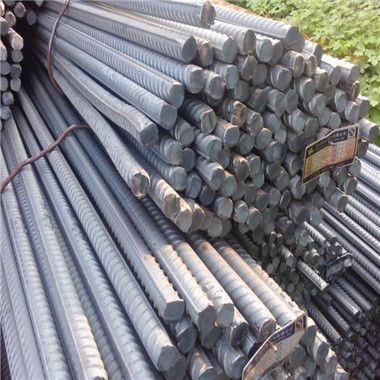
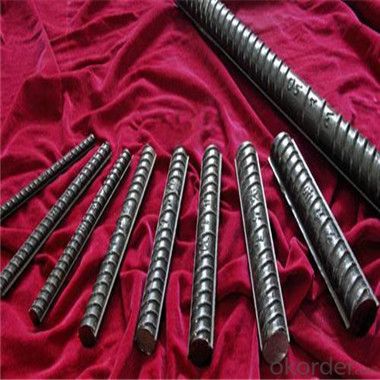
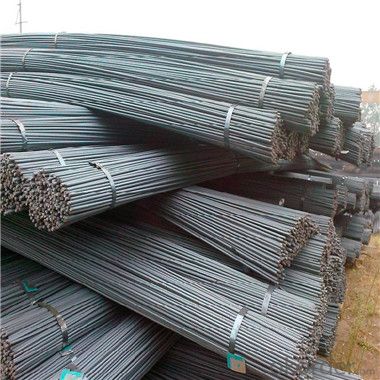
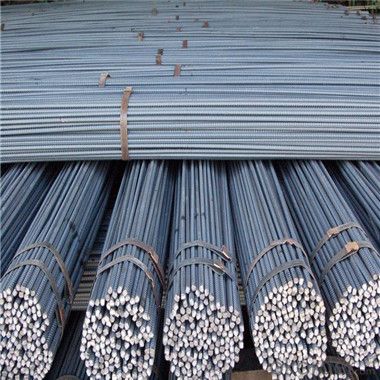
- Q: Are steel rebars suitable for reinforcement in swimming pools?
- Yes, steel rebars are suitable for reinforcement in swimming pools.
- Q: What are the factors that determine the spacing and diameter of steel rebars?
- The factors that determine the spacing and diameter of steel rebars include the structural requirements of the project, the load-bearing capacity needed, the type of concrete being used, and the design codes and regulations in place. Additionally, factors such as the spacing of adjacent rebars, the concrete cover thickness, and the construction process also play a role in determining the spacing and diameter of steel rebars.
- Q: What are the advantages of using steel rebars over other reinforcement materials?
- There are several advantages of using steel rebars over other reinforcement materials. Firstly, steel rebars provide superior strength and durability, making them highly resistant to tensile forces, which is crucial for reinforcing structures. Additionally, steel rebars have excellent bond strength with concrete, ensuring a strong and reliable bond between the two materials. Furthermore, steel rebars are readily available and cost-effective, making them a popular choice in construction projects. Lastly, steel rebars are highly versatile, allowing for various shapes and sizes, enabling engineers to customize reinforcement according to specific project requirements.
- Q: How is steel rebar manufactured?
- Steel rebar is manufactured through a process called hot rolling, where steel billets are heated and passed through a series of rollers to shape them into the desired rebar size and form. This process involves various stages such as heating, roughing, finishing, and cooling, resulting in the production of high-quality steel rebar used in construction projects.
- Q: Are there any specific guidelines for storing steel rebars on-site?
- Yes, there are specific guidelines for storing steel rebars on-site. Here are some key guidelines to consider: 1. Rebars should be stored on a flat, level surface to prevent distortion or bending. If the ground is not level, use wooden pallets or metal racks to create a stable storage area. 2. Ensure that the storage area is clean and free from any debris that could damage the rebars. Avoid storing rebars directly on the ground or in areas prone to water accumulation. 3. Proper stacking is important to prevent rebars from toppling over. Stack rebars in an orderly manner, making sure to align them vertically and horizontally. Use spacers or separators to maintain adequate spacing between the rebars and prevent them from touching each other. 4. If rebars are stored outdoors, cover them with a waterproof tarp or plastic sheeting to protect them from rain, snow, and moisture. This will help prevent rust and corrosion. 5. If rebars are stored indoors, ensure that the storage area has proper ventilation to prevent moisture buildup. This is particularly important to prevent rusting in humid environments. 6. Rebars should be stored away from any potential sources of damage, such as heavy machinery, construction equipment, or areas with high traffic. This will minimize the risk of accidental damage during construction activities. 7. Regularly inspect the rebars for any signs of damage, rust, or corrosion. If any rebars are found to be damaged, they should be removed from storage and replaced to ensure structural integrity in the construction project. Following these guidelines will help ensure that steel rebars are stored safely and maintain their structural integrity for use in construction projects.
- Q: What are the different types of couplers used for connecting steel rebars?
- There are several types of couplers used for connecting steel rebars, including mechanical couplers, welded couplers, and grouted couplers. Mechanical couplers utilize threaded or tapered designs to connect rebars, providing a strong and reliable joint. Welded couplers involve welding the rebars together, creating a permanent connection. Grouted couplers use a combination of grout and mechanical means to connect rebars, offering both load-bearing capacity and corrosion protection. The choice of coupler type depends on various factors such as project requirements, rebar diameter, and structural design.
- Q: What is the typical yield-to-ultimate strength ratio of steel rebars?
- The typical yield-to-ultimate strength ratio of steel rebars is approximately 0.85 to 0.95.
- Q: How are steel rebars different from steel mesh?
- Steel rebars and steel mesh are both reinforcement materials used in construction, but they differ in their shape and application. Steel rebars are long, slender bars with a round or deformed surface, primarily used to reinforce concrete structures like beams, columns, and walls. They provide tensile strength and prevent cracking or failure in concrete elements. On the other hand, steel mesh consists of interconnected wires forming a grid-like pattern and is commonly used to reinforce concrete slabs, pavements, and foundations. Mesh provides uniform support and distributes loads evenly, enhancing the overall strength and durability of the concrete. So, while both serve the purpose of reinforcement, rebars are ideal for vertical structures, whereas mesh is more suitable for horizontal applications.
- Q: Can steel rebars be cut on-site during construction?
- Steel rebars can indeed be cut on-site during construction. They are frequently utilized in reinforced concrete structures to enhance their durability and stability. To meet the design specifications, it may be necessary to trim the rebars to certain lengths or shapes. This task can be accomplished with a range of tools including rebar cutters, angle grinders, or oxy-fuel cutting torches. Nevertheless, it is crucial to adhere to safety protocols and employ suitable protective equipment while cutting rebars on-site in order to avert any mishaps or harm.
- Q: Are steel rebars suitable for high-rise buildings?
- High-rise buildings can benefit greatly from the use of steel rebars. These reinforcing bars, also known as steel rebars, are extensively utilized in the construction industry to add strength and stability to concrete structures. The robustness of high-rise buildings necessitates sturdy structural elements that can withstand the substantial loads and forces experienced at greater heights. Steel rebars are perfectly suited for this purpose due to their exceptional tensile strength, durability, and capacity to endure heavy loads. Utilizing steel rebars in high-rise buildings presents numerous advantages. Firstly, these rebars offer outstanding tensile strength, which is essential for counteracting the tensile forces that manifest in tall structures. By distributing the load evenly throughout the building, these rebars prevent the concrete from cracking or failing under pressure. Secondly, steel rebars possess remarkable durability, rendering them ideal for enduring the stresses and strains endured by high-rise buildings. They boast a lengthy lifespan and can withstand exposure to severe environmental conditions, including extreme temperatures, moisture, and corrosion. This durability ensures the building's longevity and safety. Furthermore, steel rebars can be easily fabricated and installed, enabling efficient construction processes in high-rise buildings. The adaptability and versatility of steel rebars make them suitable for various structural designs and configurations, empowering architects and engineers to create innovative and efficient building systems. Moreover, incorporating steel rebars in high-rise buildings enhances fire resistance. Owing to steel's high melting point, steel rebars can help prevent structural collapse in the event of a fire. This factor is crucial for occupant safety and the overall integrity of the building. In conclusion, steel rebars are undeniably suitable for high-rise buildings. Their exceptional tensile strength, durability, ease of fabrication, and fire resistance make them an excellent choice for providing structural stability and strength in tall structures. Utilizing steel rebars guarantees the safety, longevity, and dependability of high-rise buildings.
Send your message to us
HRB400 Reinforced Deformed Steel Bar
- Loading Port:
- China main port
- Payment Terms:
- TT OR LC
- Min Order Qty:
- 100 m.t.
- Supply Capability:
- 100000 m.t./month
OKorder Service Pledge
OKorder Financial Service
Similar products
Hot products
Hot Searches
Related keywords
